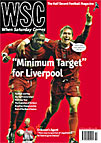 And you think rebuilding Wembley was a saga. Paul Doyle reports on the homelessness crisis that could bring the Republic of Ireland to a ground nearer than you would think
And you think rebuilding Wembley was a saga. Paul Doyle reports on the homelessness crisis that could bring the Republic of Ireland to a ground nearer than you would think
Can Irish football recover from its current crisis? A nation that was last year trying to convince the continent it should co-host Euro 2008 is set to admit that it cannot, in fact, host its own home matches.
The derogation the Football Association of Ireland received from FIFA to allow them to use temporary seating in the decrepit Lansdowne Road has expired, reducing that ground’s capacity for competitive games to a glum 22,000. This would mean a huge drop in income for the FAI and the depressing spectacle of empty terraces behind both goals. So why not play our 2006 World Cup qualifiers, including that plum tie against France, at the country’s next best soccer stadium, Shelbourne’s Tolka Park? Because it holds 12,000 people and offers malodorous walls as toilets.
The FAI has admitted contemplating the humiliation of playing home matches in Britain. Boss Fran Rooney tried to soften the blow by insisting the Boys in Green would adopt a city “with a large Irish community”, such as Birmingham or Liverpool, though some say the FAI are hoping to persuade the Irish shareholders in Man Utd to let them use Old Trafford for free. Celtic Park has been cited for the same reason. There have even been suggestions that Brian Kerr’s assistant, Chris Hughton, might persuade his other employers to hand over White Hart Lane.
This, of course, all smacks of half-arsery of the lowest order, but football has seen stranger things. It hasn’t, though, seen many things as strange as group rivals playing their home matches on the same ground in England. But that could be about to happen because Israel, who have abandoned their alternative home in Nicosia after Cyprus were drawn in the same group too, are also keen on settling in White Hart Lane.
Two things can save the Irish from exile. The first is if the Gaelic Athletic Association decides to make its majestic 80,000-seat Croke Park available. GAA rules ban “foreign” games, but selling out to soccer would help relieve its hefty debts. Its more fundamentalist members, however, insist they’d lose their soul in the process and though the GAA recently hinted it might permit rugby on its hallowed turf – because that code “does not recognise the partition” (ie there is a joint Republic and Northern Ireland team) – soccer remains a detested heretic.
The second is if the FAI can present FIFA with concrete plans for a new stadium or a modernised Lansdowne Road – and then, as Fran Rooney puts it, “plead hard for one last derogation” through to 2006 on temporary seating.
Any chance of the government help-ing out? As much chance as Ireland have of beating France, wherever the hell the match is eventually played. Five years after the then minister of sport said the country must build a national stadium because “every other banana republic has”, Prime Minister Bertie Ahern is still babbling about the pet project he has staked his credibility on – a €1 billion (£700 million) 80,000-capacity multi-sport arena that will make Ireland “the envy of the world”. But he has yet to explain when or how it will be built.
Bertie isn’t the only man with a plan. The threat of playing in England has provoked bizarre brainstorming, with any public figure worth his salt – plus many who aren’t – proffering proposals. One even opined that if Japan can build an airport in the sea, then Ireland could build a floating stadium and make money by towing it around Europe to rent to other countries.
The fans, meanwhile, just splutter and moan about the scandal and the sheer bloody mortification of it all. Very few of them are prepared to admit that they have contributed to the problem: after all, if more of them followed local football rather than scurrying across to Britain every weekend, then clubs here might actually be able to afford a decent home. The moral of this sorry tale may just be: you get the stadium you deserve.
From WSC 204 February 2004. What was happening this month